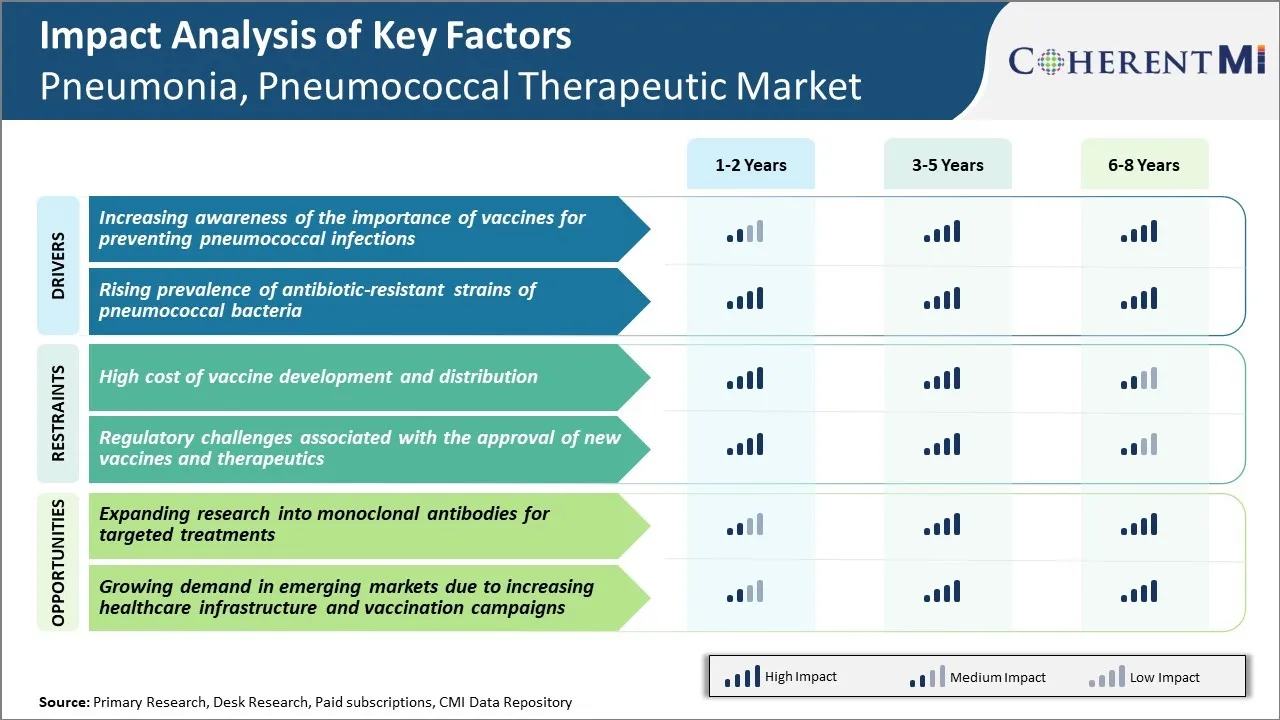肺炎、肺炎球菌治疗市场 规模与份额分析 - 成长趋势与预测 (2024 - 2031)
肺炎、肺球菌治疗市场按管理方式划分(Oral、Intravenous、Subcutaine、Purderal、Topical), 由分子类型(重组蛋白,小分子,单克隆抗体,Peptide Polymer,基因治疗),按地理(北美,拉丁美洲,亚太,欧洲,中东,非洲)分类. 本报告为上述部分提供了价值(....
肺炎、肺炎球菌治疗市场 趋势
市场驱动力 - 提高对疫苗对预防肺炎球菌感染的重要性的认识
越来越多的人意识到,肺炎和肺炎球菌感染可以通过接种预防。 近年来,医生和保健组织大大加强了肺炎球菌疫苗的教育和咨询工作。
他们向病人,特别是老年病人和慢性病患者宣传细菌链球菌肺炎是如何成为肺炎的主要原因之一的。 它还会导致其他严重的疾病,如细菌性贫血和脑膜炎. 随着数字媒体和社会网络的兴起,卫生信息更容易获得,这促进了知识的增长。
疫苗接种在预防肺炎球菌疾病方面发挥着关键作用。 医生强调,PCV13和PPSV23等疫苗有助于建立免疫力,因此身体准备与引起细菌的感染作斗争. 它们降低了患肺炎球菌感染的风险,即使接种疫苗后感染,疾病也有可能不那么严重. 随着对此的更深入了解,更多的人愿意获得推荐的肺炎球菌疫苗. 公共卫生运动还使人们进一步认识到儿童接种疫苗如何提供牲畜免疫和保护老年人和高危群体。
市场驱动力 -- -- 抗生素抗性肺炎球菌菌的流行率上升
全球持续关注的一个问题是,抗生素抗药性的威胁在细菌演化并不受现有药物影响的情况下日益增大。 肺炎球菌也以惊人的速度发展抗药性. 若干抗生素抗菌菌株已经出现,并广泛存在于社区。
主要原因之一是病毒性上呼吸道疾病大量过度使用和滥用抗生素,这些疾病对病毒性上呼吸道疾病没有影响。 当抗生素被不分青红皂白地为小病开处方时,它给细菌带来了巨大的选择压力,使它们在这些药物周围突变。 因此,抗药性形式被选中,然后在个体之间传递.
现在许多常规抗生素对于这些“超级虫”来说是无效的, 耐药性肺炎引起的肺炎也会导致更糟糕的结果和死亡的增加. 抗生素耐药菌株的增加在艾滋病毒高发地区以及收容老年人或免疫妥协患者的机构尤其令人担忧。
面对这种日益严重的威胁,保健提供者感到不得不使用较新的、往往更昂贵的广谱抗生素。 由于管理上的困难更大,它也在推动更多地采用旨在预防的肺炎球菌疫苗。 全世界肺炎球菌的抗微生物抗药性不断提高是推动治疗市场向前发展的一个主要关切。

市场挑战 -- -- 疫苗研发和分销成本高
目前肺炎,肺炎球菌治疗市场中玩家面临的主要挑战之一是疫苗研发和分销成本高昂. 研制有效的疫苗涉及广泛的研究和临床试验,以确保安全和功效。 这一研发进程需要大量投资,并有很高的失败风险。
即使疫苗使疫苗成功进入所有发展阶段,但制造、储存和分销成本也带来巨大的财政挑战,特别是在保健基础设施薄弱和购买力较低的发展中国家。
确保向边远和农村人口提供疫苗,进一步增加了费用。 此外,必须保持疫苗价格的可承受性,以改善获得疫苗的机会,但在经济上可行的价格点内支付高昂的开发费用是困难的。 玩家需要探索政府补贴,公私营伙伴关系等战略,并优先考虑造成死亡率最高的疾病,以平衡利润和公共卫生目标。
总体而言,疫苗价值链中所需的高额资金支出仍然是全球更好地预防肺炎的主要障碍。
市场机会----扩大对单克隆的研究 目标治疗抗体
肺炎,肺炎球菌治疗市场中玩家的一个关键机会在于加强侧重于单克隆抗体的研究工作. 单体抗体已成为一类重要的定向生物疗法,可同时用于治疗和预防传染病。
与疫苗相比,单克隆抗体具有快速起效,提供短期防护能力等优点,不需要一段时间内多剂量才能持续发挥作用. 一些单克隆抗体已经在临床试验中,用于治疗链球菌肺炎等病原体引起的呼吸道感染,测试新分子可以解锁新的治疗方案.
此外,单克隆抗体可能能够在肺炎季节为老年人等高危群体提供临时保护,作为疫苗的替代品或补充。 随着持续研发,单克隆抗体显示出扩大产品组合,解决肺炎治疗空间未满足需求的前景.